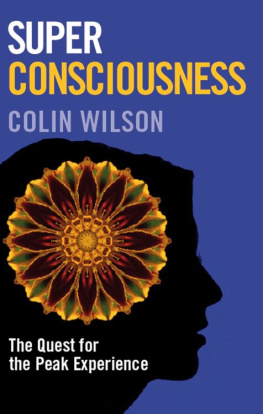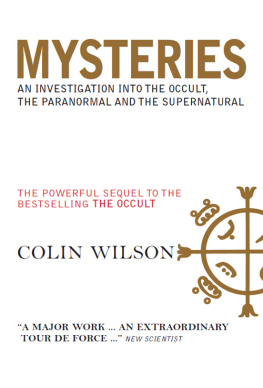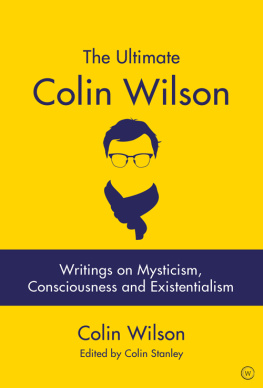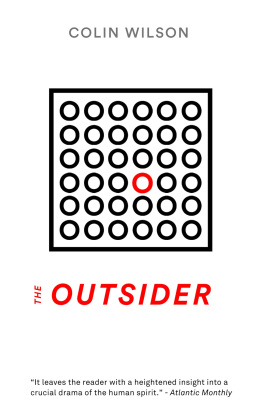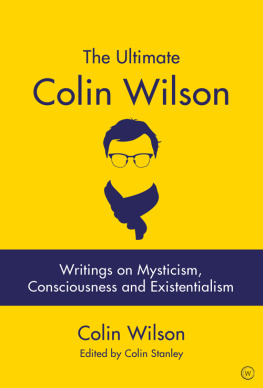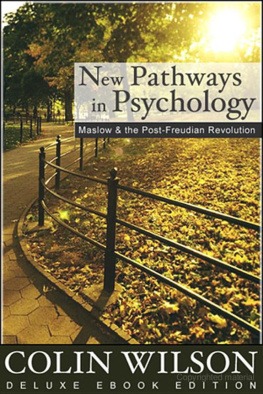Colin Wilson is one of the most prolific, versatile and popular writers at work today. He was born in Leicester in 1931, and left school at sixteen. After he had spent years working in a wool warehouse, a laboratory, a plastics factory and a coffee bar his first book The Outsider was published in 1956. It received outstanding critical acclaim and was an immediate bestseller.
Since then he has written many books on philosophy, the occult, crime and sexual deviance, plus a host of successful novels which have won him an international reputation. His work has been translated into Spanish, French, Swedish, Dutch, Japanese, German, Italian, Portuguese, Danish, Norwegian, Finnish and Hebrew.
By the same author
Non-fiction
The Outsider cycle:
The Outsider
Religion and the Rebel
The Age of Defeat
The Strength to Dream
Origins of the Sexual Impulse
Beyond the Outsider
Introduction to the New Existentialism
Books on the occult and paranormal
The Occult
Beyond the Occult
Mysteries
Poltergeist
The Psychic Detectives
Strange Powers
The Geller Phenomenon
A Dictionary of Possibilities
(with John Grant)
Other non-fiction:
Encyclopedia of Murder
(with Pat Pitman)
Encyclopedia of Modern Murder
(with Donald Seaman)
A Casebook of Murder
Order of Assassins
Rasputin and the Fall of the Romanovs
Bernard Shaw A Reassessment
New Pathways in Psychology
The Quest for Wilhelm Reich
The War Against Sleep The Philosophy of Gurdjieff
Lord of the Underworld A Study of Jung
The Craft of the Novel
The Strange Genius of David Lindsay
Frankensteins Castle
Access to Inner Worlds
Eagle and Earwig (essays on books and writers)
Poetry and Mysticism
A Book of Booze
Starseekers
Brandy of the Damned (essays on music)
Anti-Sartre
The Misfits
Autobiography
Voyage to a Beginning
Fiction
The Sorme trilogy:
Ritual in the Dark
The Man without a Shadow (re-titled The Sex Diary
of Gerard Sorme )
The God of the Labyrinth
Other fiction
Adrift in Soho
The World of Violence
Necessary Doubt
The Glass Cage
The Mind Parasites
The Killer
The Philosophers Stone
The Black Room
The Space Vampires
The Schoolgirl Murder Case
Rasputin: A Novel
Spider World: The Tower
Spider World: The Delta
Super Consciousness
The Quest for the
Peak Experience
Colin Wilson
EISBN (KINDLE): 978-1-780280-79-0
VERSION 1.0
This edition published in the UK 2009 by
Watkins Publishing, Sixth Floor, Castle House,
7576 Wells Street, London W1T 3QH
Text copyright Colin Wilson 2009
Colin Wilson has asserted his right under the Copyright, Designs
and Patents Act 1988 to be identified as the author of this work.
All rights reserved.
No part of this book may be reproduced or utilized in any form
or by any means, electronic or mechanical,
without prior permission in writing from the Publishers.
1 3 5 7 9 10 8 6 4 2
Designed by Jerry Goldie
Printed and bound in Great Britain
British Library Cataloguing-in-Publication Data Available
ISBN: 978-1-780280-79-0
www.watkinspublishing.co.uk
Contents
Foreword
1 The Discovery of Inner Freedom
2 The Ecclesiastes Effect
3 The Sexual Explosion
4 What is Cosmic Consciousness?
5 The Near and the Far
6 The Paradoxes of Nihilism
7 Absurd Good News
8 The Two Selves
9 A Brief Outline of History
10 Strange Powers
11 Faculty X and the Sexual Vision
12 Philosophy
13 Achieving Power Consciousness
Postscript
Foreword
I am now 75, and most of my life has been devoted to a search for what might be called the mechanisms of the Peak Experience, or power consciousness. This book might be regarded as a kind of DIY manual of how to achieve it.
Let me begin with an example of what I mean by power consciousness. It concerns Blaise Pascal, and is from my book Religion and the Rebel :
After a year of deteriorating health and spiritual uncertainty, Blaise Pascal had a vision. It was on the 23rd of November, 1654. At half past ten in the evening probably as he lay in bed an overpowering sense of health and vitality suddenly swept over him, a feeling of complete and total well-being; a certainty so sudden and complete that, when he wrote about it, he headed the page: fire. The sensation lasted for two hours, and he tried to capture it on paper. As he wrote, his feelings changed no vision can be sustained for two hours and he began to feel that he had sinned for the past few years. This is always the way with a vision. The first sensation is of vitality that makes one affirm all existence, and love, love of the world, of its physical reality. As this certainty dies away, one becomes aware of the need for discipline if it is to be recaptured, and of ones lack of discipline in the past. Pascals Memorial begins:
fire
God of Abraham, God of Isaac, God of Jacob, not of the
philosophers and scholars.
Certitude, certitude, feeling, joy, peace.
Pascal sewed this account of his vision into his clothes, and carried it with him until his death.
Here is another example, from Vacillation by W B Yeats:
My fiftieth year had come and gone,
I sat, a solitary man,
In a crowded London shop,
An open book and empty cup
On the marble table-top.
As on the shop and street I gazed
My body of a sudden blazed;
And twenty minutes more or less
It seemed, so great my happiness,
That I was blessd and could bless.
Why did it happen? Yeats obviously had no idea. Neither have I. But I can pinpoint when I became actively involved in the subject.
Thirty-eight years ago, in 1969, I was asked to write a biography of the American psychologist Abraham Maslow. Maslow had first contacted me in the mid-1960s after reading a book of mine called The Age of Defeat (in America, The Stature of Man ), in which I complained that throughout the 20th century, there has been a strong defeat-bias in literature You cant win due to what I called the fallacy of insignificance the feeling of most serious writers that life is a long-drawn-out defeat. (Or, as Sartre put it: It is meaningless that we live and meaningless that we die.) Only in childrens stories and thrillers does the hero succeed in winning.
Maslow told me he was excited by this because he also had a deep conviction that human nature has been sold short by modern psychology Freud in particular and that we ought to take account of what he, Maslow, called higher ceilings of human nature.
What fascinated me was Maslows concept of the peak experience (he called them PEs) the experience of sudden overwhelming happiness, the feeling that life is wonderful; this, Maslow discovered, seems to happen to healthy people on a regular basis.
Here is a typical PE. A young mother was sitting watching her husband and children eating breakfast, when she was suddenly overwhelmed by a feeling of how much she loved them and how lucky she was: she went into the peak experience.
But note this: she was lucky before she went into the peak experience. The peak experience simply involved becoming aware of how lucky she was. It really amounts to what G K Chesterton once called absurd good news a sudden sense of wonderful optimism about the future, the feeling that life is infinitely complex and infinitely exciting.
Moreover, Maslow discovered that when he talked to his students about peak experiences, they began remembering peak experiences that they had half forgotten about. For example, one young man was working his way through college as a jazz drummer, and he described how, at about two oclock one morning, he began drumming so perfectly that he couldnt do a thing wrong; he went into the peak experience.

